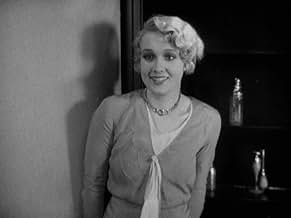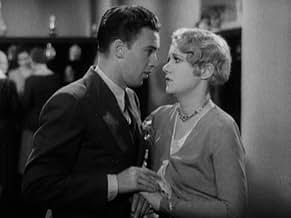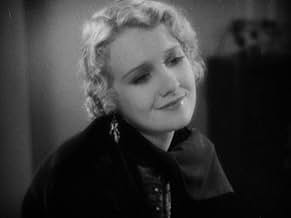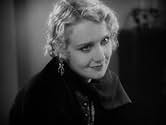Ajouter une intrigue dans votre langueThree department store employees, Connie, Franky, and Jerry, share an apartment together in New York City. Despite Jerry's pragmatism, Connie and Franky pursue wealthy men for financial gain... Tout lireThree department store employees, Connie, Franky, and Jerry, share an apartment together in New York City. Despite Jerry's pragmatism, Connie and Franky pursue wealthy men for financial gain, leading to disappointment and heartbreak.Three department store employees, Connie, Franky, and Jerry, share an apartment together in New York City. Despite Jerry's pragmatism, Connie and Franky pursue wealthy men for financial gain, leading to disappointment and heartbreak.
- Réalisation
- Scénario
- Casting principal
- Récompenses
- 3 victoires au total
- The Detective
- (as Robert O'Connor)
- A Mannequin
- (as Wilda Mansfield)
Avis à la une
You can really see the onset of the Great Depression having an effect in this final film of the trilogy. The first two films involve lots of melodrama, but there is also widespread prosperity and a focus on living it up with partying that reflects the excesses of the 1920's. This final film really isn't about living it up at all. It's more about three shop girls just getting by and how the men in the lives of two of them (Anita Page and Dorothy Sebastian) promise the good life but end up raining down tragedy upon them, while the third shop girl, Gerry (Joan Crawford), has her own cynical attitude towards men reinforced by watching the fates of her two friends. That makes the ending seem a little tacked on and even unbelievable to some degree, but it's still a good film.
Unfortunately this film is neither on DVD or VHS. "Our Dancing Daughters" and "Our Modern Maidens" can be found on used VHS copies, but the transfer is pretty blurry. None of the three is on DVD, and considering their place in Joan Crawford's filmography, I find that to be a shame.
This is a pre-code film, and despite the above-mentioned problems, they're always interesting to watch. This one had to do with giving in to one's baser instincts (having sex) for money and the good life. This is 1930, and America was still preoccupied with class distinctions. Gerry refuses to give in to Tony, but her roommate Connie (Anita Page) is kept by his brother David. Franky (Dorothy Sebastian) marries a big talker.
Two scenes stick out as a sign of the times - outside Gerry's apartment building on a hot summer night, the street is teeming with kids playing, an ice cream cart, and people sitting on the stoop. A very realistic portrayal of cities back then. With no air conditioning and no television, people sat outside for the air and to talk with their neighbors. Social interaction, not social networks, Internet, and cable, provided their entertainment.
The second striking thing was the radio description of an engagement of a couple from socially prominent families. I remember seeing an old Vogue magazine where an woman engaged to some sort of royalty got a full page portrait. Not uncommon.
For anyone who only knows the hard-faced Joan Crawford of later years, this movie will serve as a revelation. Made for movies with those huge, mesmerizing eyes, beautiful face, and trim figure, Crawford shines here. At times she sounds like she's sporting some sort of affected accent, though I don't know why. Page and Sebastian are also very good in their roles. Montgomery is underused - he was more than a dashing leading man - but he looks great and does the role well.
All in all, worth seeing for the young Crawford and a look at life in 1930 for shop girls.
Our Blushing Brides was the third and last of the "Our" series of films, which started in 1928 with the success of Our Dancing Daughters. It is also the best of the three, with an intelligent script, fabulous art deco sets, and terrific performances.
Joan Crawford stars as Gerry, who works in a department store and lives in an apartment with three other young women, played by Anita Page and Dorothy Sebastian. Each of these women is being pursued by rich men.
Sebastian is out for money. She marries a rich man on their first date, after he promises her that she will never have to wake up to an alarm again. Page is in love with the wealthy son of the department store owner, who is in love with her but will not marry her. Crawford is disillusioned and does not trust men. She is the most independent of the three, but even she has trouble resisting the advances of a young and handsome Robert Montgomery, also a son of the department store owner.
When Crawford discovers Montgomery's intentions are motivated purely by lust, after being lured to his art deco tree loft for a midnight rendezvous, she walks out on him and keeps him guessing. Meanwhile, Page and Sebastian find out their men are cads, using them for sex and going out on them behind their backs. Sebastian's husband is arrested, and Page's beau marries someone else, prompting her to swallow poison.
Crawford, in a fit of rage, rushes to the wedding and orders Page's former beau to return to her until she gets well. Montgomery, sensing the reason why Crawford distrusted men, loves her all the more for it. But what will become of Page and Sebastian, and will Montgomery finally be the man Crawford can trust and love? This is an excellent pre-code, with moments of funny comedy and tearful drama. If you want to see a set of actors at their vibrant and youthful best, you have to give this little-known film a chance.
Le saviez-vous
- AnecdotesJerry tells her malingering roommate, "Snap out of it, Lady Vere de Vere." This lady was the subject of a poem by Alfred Lord Tennyson. She was the haughtiest and coldest lady in the peerage, and the one with the noblest title. Her name has become an ironic way of referring to someone who is acting snooty.
- Citations
Mrs. Hinkle, the Landlady: Mr. Carter, third floor front. He's a process server. That's a real influential job. He thinks you're pretty nice. He'd like to take you out.
Geraldine 'Gerry' March: No, thank you, Mrs. Hinkle. You see, I'm avoiding process servers this season
- ConnexionsFeatured in Joan Crawford: The Ultimate Movie Star (2002)
- Bandes originalesThe Wedding March
(1843) (uncredited)
from "A Midsummer Night's Dream, Op.61"
Written by Felix Mendelssohn
Played during the opening and closing credits
Meilleurs choix
- How long is Our Blushing Brides?Alimenté par Alexa
Détails
- Date de sortie
- Pays d’origine
- Langue
- Aussi connu sous le nom de
- Our Blushing Brides
- Lieux de tournage
- Société de production
- Voir plus de crédits d'entreprise sur IMDbPro
Box-office
- Budget
- 337 000 $US (estimé)
- Durée1 heure 42 minutes
- Couleur
Contribuer à cette page





































